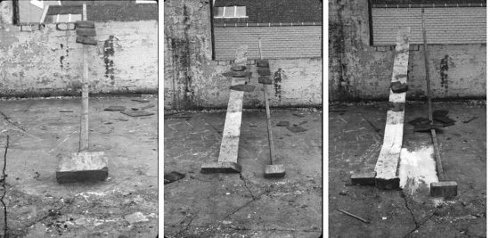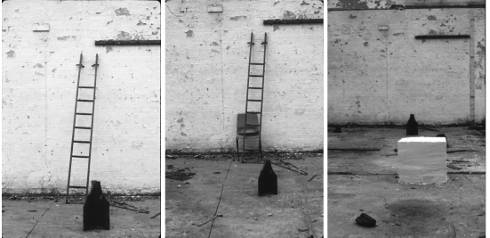U: As far as we know you originally come from Northern England. In which city or region did you grow up?
I come from a town just outside the city of Stoke on Trent between Manchester and Birmingham. It’s actually more like national purgatory, neither north or south in a country obsessed with the divide. I moved when I was 19 but people still pick up on my accent.
U: Northern English cities like Manchester, Sheffield or Newcastle have always played an important role in the history of popular music – many Northern Soul, Post Punk or Experimental acts come from there. How much did this creative flair influence you at an early age, and what sort of music did you listen to?
I grew up in a tiny market town – our record shop was the local Woolworths store. They’d closed the railway line years before and the last bus from Stoke was around 7pm so it wasn’t exactly the Hacienda in my town.
As a boy I was terrified of Leonard Cohen’s Live Songs (1973) on account of the cover. It was in my folks record collection and I wondered why they possessed this LP by a convict – I thought it was recorded in a prison shower cubicle something – tiled walls, shaved head, staring. It took me years to actually play it. I was mesmerized.
I remember renting out cassettes from the local library. Faust IV, SWANS Greed/Holy Money, Fleetwood Mac’s Tusk, Tom Waits’ Bone Machine, Talking Heads Fear of Music were all well overdue! I liked a lot of stuff on 4AD as well, especially The Pixies. I came to The Smiths late. Obviously you’re aware of those scenes as a youngster but I never really identified with music in that way. I wasn’t what you’d call a cool teenager.
U: Have you been in music groups before Mute Swimmer, and how did it come to forming this project?
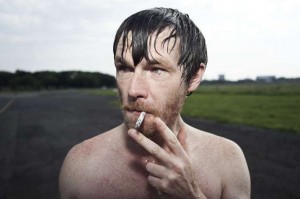 I started experimenting with four track tape stuff when I was studying art at college. I used to hit the guitar more than play it back then. This developed into the Dala project that is now a sometime three piece with my friends Brunstein and Dave Parker. Around 2005 I self released “Treehouse” (under the name G. Dale). Some local musicians in Brighton saw some shows, we started playing together. The band was called Funés (taken from the Jorge Luis Borges short story about a boy who cannot forget anything he has ever seen). We split up just as we were getting good. I’d used the name Mute Swimmer before I went to South America but I think I came back with a better sense of what Mute Swimmer was, or what I wanted it to be.
I started experimenting with four track tape stuff when I was studying art at college. I used to hit the guitar more than play it back then. This developed into the Dala project that is now a sometime three piece with my friends Brunstein and Dave Parker. Around 2005 I self released “Treehouse” (under the name G. Dale). Some local musicians in Brighton saw some shows, we started playing together. The band was called Funés (taken from the Jorge Luis Borges short story about a boy who cannot forget anything he has ever seen). We split up just as we were getting good. I’d used the name Mute Swimmer before I went to South America but I think I came back with a better sense of what Mute Swimmer was, or what I wanted it to be.
U: How long have you been to South America and have you also been involved into art and music at that time?
I was in South America for eight or nine months. It was something I’d wanted to do for a long time though I wasn’t sure why. I bought a cheap nylon guitar and travelled with that but I didn’t go with that purpose. I made very little there, there was too much to take in. I learnt some Spanish in Buenos Aires and worked my way up to Colombia. It was good.
U: You are often introduced as a folk singer, which seems fitting for some songs, but it’s probably a bit shallow for describing the style as a whole. How do you think about such categories in general, and how would you describe the music to someone, who has not heard it before?
Yeah I have a hard time describing what I do to people. I once drunkenly told someone it was ‘sabotage dressed up as song’. The folk tag is a bit lazy but artists always hate them and I’m no exception. I mean a category is useful only when you need to define it outside it’s own terms – so you see your work go from the specific to generic, creation to consumption in an instant. At the same time you realise when you’re promoting something that people need an easy point of reference/access – so if they come at it through ‚art folk’ or whatever that’s okay too, you know, ultimately you want people to listen to the music - after that the tag becomes virtually obsolete again and they make up their own mind what it is.
U: Your poetical lyrics are as important as the music, there are moments, when they even might have priority. Do you always start with words, when you write a song?
If you’re using words with music there has to be a balance but I think a lot of songwriters take that too literally. Balance can be achieved by contrast, the suppression or highlighting of one or the other at different points within a song (or album). I’d look to late Scott Walker or Talk Talk as exhibiting a mastery of that kind of balance.
Sometimes the melodies are more implied than given – a bit like the violence in a Hitchcock film. Sometimes I omit both you know, I think silence is a pretty underrated part of the process. The music comes first usually and the words follow, s l o w l y. Occasionally a song arrives virtually whole in my head and I have to run home and find an instrument to translate it to. That’s a rare grace though.
U: I wonder how ambivalent you are towards language in general, how much you regard it as something that offers resistance and arouses some sort of opposition to let a creative process begin. I think I snapped a bit of this feeling in the songs of your latest 7”…
That’s an interesting question but I think the work speaks for itself here. You could say I write with an equal measure of respect for and suspicion of language yeah. Of course when you’re singing you can also modulate the inherent meaning of the words with tone and melody. “I Went to Write” off the “Orientation” EP would be an example of playing with that. The songs on the 7“ are idiomatic of that approach too. I’ve got pretty economical with lyric writing. It’s deeply serious and utterly absurd and at the same time. For me that’s an interesting place to write from.
U: One of my favourite pieces by you is „Different Name“, which reflects on the idea of changing your identity. In that song you quote lines from an old jazz classic about the joys of a symbiotic relationship. Would you say that this old song is not such a happy one, though it appears so at a first glance?
People seem to have a developed a special attachment to that song and that’s lovely. Suffice to say you can read Different Name in a lot of ways and perhaps therein lies some of it’s appeal. As for the Cole Porter quote, cool you noticed it. I love Frank’s version especially.
U: You are also a visual artist. As Mute Swimmer seems to have a considerable multi media affinity, has there ever been a time, when you thought you had to make a decision which art form to pursue?
Increasingly I don’t separate what I do with sound and songs with what I make and exhibit. Before that yes – there was a conflict of sorts – but the closer the songs approached the concerns of my art practice, the more interesting and convincing they seemed to become and the less like other songs they began to sound.
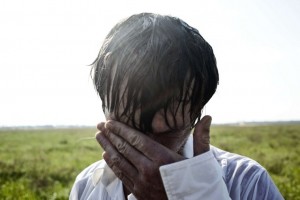 K: Now we have reached an interesting point. Guy, you studied art in London. I was wondering if you could tell us a bit more about your art practice. What drew you to the path of art?
K: Now we have reached an interesting point. Guy, you studied art in London. I was wondering if you could tell us a bit more about your art practice. What drew you to the path of art?
I actually studied art in Stoke and Leicester but I exhibited in London quite a lot. I guess art, in the first instance, allowed me to address some conflicts during adolescence. There’s a point at which that self absorption / art as therapy thing turns into something else or gets absorbed in a different way but art in my teens was massively important. It sounds melodramatic to say it saved me in some way but I think it did. Sometimes I draw on that heightened state of awareness and anxiety you feel in your teens because it’s so pure. “Song Against Itself” is part adolescent meltdown and part meta-textual joke I guess.
K: Are you still working in the field of art? For instance, are you going to have an exhibition in the foreseeable future?
I exhibited in Madrid last year. The piece had to be posted so I made a photographic replica of an envelope, stamped and addressed to the curator. This fake letter actually arrived and that was ‘the work’. So yes I’m still active.
K: What is your latest project or on what are you working at the moment?
I have a bunch of new songs ready to go. In April I’m going to Denmark to record them in a log cabin just outside Copenhagen. I don’t want to jinx it too much but I’m really excited. I think the songs are among the best I’ve written and I’m looking forward to augmenting them in a different way from the last records. Not sure how or who it will come out with yet, we’ll have to see.
K: Has there been a certain experience that led you away from producing objects to a more immaterial, performance-orientated approach?
I can’t think of a particular experience especially, not one that I could easily explain here but I’d been interested in those ideas long before I began performing. A lot of the work begins from recognising what you make is ultimately insignificant and pointless and at the same time knowing it’s the most important, significant thing you can do. There’s an implicit contradiction or crisis in that that I make explicit. I don’t think I’m alone in that feeling at all – it’s perhaps just unusual to take that as a point of departure for making stuff.
K: Also, you are screening films while performing your songs on the stage. Do you show your own artworks, personal material or found footage?
None of the above. Like a lot of the songs, the visuals lock everything into the moment – they relay the room, the audience, myself with a slight delay. You are looking at the moment of a moment just passed of a moment just passed…and so on into in ever degrading recession. A press release might say it’s like David Lynch shooting a Buddhist’s dream.
K: What kind of relation would you possibly establish between your developments in art and your recent performances on stage?
Well in most respects I see them as contiguous. I don’t think you necessarily have to define yourself exclusively as a painter, photographer, song writer, sound artist etc. You just have certain ideas that lend themselves to a particular medium and you use them. It’s like having multiple intimacies. I guess I’m having an intense affair with songs right now.
Perhaps there aren’t any new ideas, you just open up existing ones that act on you in various peculiar ways and hope that they connect with your audience in a new way. Most things I’ve done, in whatever medium have been the result of two or three ideas that marked me in some way, that I still find profoundly exciting and inspirational.
K: Could you tell us about artworks/artists that brings you inspiration? And does this reflect somehow in your music? I’m thinking of Stephen Burch from The Great Park. He has written a song for a painting which is exhibited in a museum in the Netherlands …
I’ve been inspired by all sorts of stuff – Duchamp, Beuys, Rothko, Cage, Richter, Jorge Luis Borges (the writer) are people I go back to again and again. I went through a period of hating Magritte and then loving him again.
As I’ve gone on with things I’ve discovered crossover projects like Art and Language with Red Krayola, Alvin Lucier’s I am Sitting in a Room or Martin Creed’s works as songs. Even if the methods and outcomes are radically different I get this sense of common territory.
The Groningen Museum thing was a perfect project for TGP. I was actually staying with Stephen (and Fee Reega) in Berlin when he was recording that track. Its a fascinating idea. I don’t think it would work for me at the moment simply because I’m more interested in suppressing the narrative function of the writing than extending it. I’m not occupied with responding to art through song, I’m occupied with making art through song and they are quite different things.
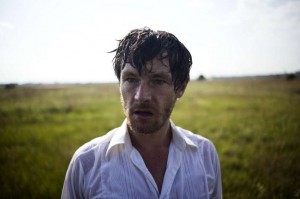 U: Most of the concerts we attended were solo shows, but you often cooperate with other musicians. Who are the persons, that play and played roles in Mute Swimmer?
U: Most of the concerts we attended were solo shows, but you often cooperate with other musicians. Who are the persons, that play and played roles in Mute Swimmer?
Yea I like to play with other people. They are generally just people I’ve met who became friends – often they are better musicians than I am – they adapt to or intuit what I’m looking for in a song. I began collaborating with Matt Kerry (The Freed Unit) years back – some of our instrumentals are on the first G. Dale record. Laurence (The Diamond Family Archive) and Stephen (The Great Park) were kind enough to give their time to the first Mute Swimmer record. Nezih (Antalki) is a very old friend of mine. He recorded most of the percussion for the first Mute Swimmer record in his living room in Philadelphia. Kay (Johnson) is another old friend. She sings on Different Name. I think her harmonies are a big reason people keep going back to that old song. I don’t think she has any idea how talented she is…Tom (Marsh – The Robot Heart/Diagrams) and I got drunk just before I left for Berlin and we put down the single (Song Against Itself/Some Examples) in a studio in Brighton; fast. That single is the sound of two people playing by the seat of their pants. Tom comes over to Berlin and plays with me here when he can. Invariably we drink too much and misbehave. Other friends like Brunstein and Preslav Literary School came in and remixed the single afterwards too which was fascinating. I’d like to do more of that.
K: Your performance on stage is filled with introspective moments and an interesting concept of participation. For instance in the song “No Time (Shut the Fuck Up)”, the audience plays an integral part as they are being asked to repeat the same sentence over 4 minutes. Which ends up in screaming the sentence sometimes … This particular song seems to challenge the limits of patience and endurance at the same time. What is the role of the audience in your work?
The audience is really important to what I do – vocal participation or not – because often I’m addressing them personally and in the present tense – there is a very explicit relationship there that determines the nature of the gig and the material itself to an extent.
Repetition, patience, endurance – I like to play with all that stuff. Repetition is hook, mantra, irritant or sedative, depending. I think with a song like “Same” I wanted it to be all those things at once. To paraphrase John Cage – if you find something boring do it again.
“No Time (Shut the Fuck Up)” is a joke, a lot of my work is a joke but that doesn’t mean I’m not serious about it.
K: Where did the idea come from? What are you trying to bring up through this participation?
Well I don’t actually like audience participation but because of that I’ve come to find it interesting. I guess you could say I’m exploring the border between the audience and the performer in some ways but the truth is I couldn’t afford the looping pedal to create the track on my own. As with a lot of your limitations, you can find they turn out to be your blessings as well.
“No Time (Shut the Fuck Up)” comes out of the contradictory impulse I was talking about earlier. Sometimes I genuinely lose myself playing that song. I’m looking for that when I play – a kind of self forgetting, grace or abandon – even as it’s mitigated by a doubt that the audience externalises for me.
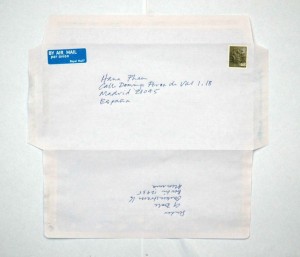 K: What would you wish the audience comprehend after seeing or your performance?
K: What would you wish the audience comprehend after seeing or your performance?
I don’t want them to comprehend anything. I don’t have an agenda or educational goal. That wouldn’t be much fun. What the audience take away from the show will be a combination of some things I can control and many things that I can’t. You hope that you reach people in some way, however momentarily, beyond the bare physiognomy of receiving sound – emotionally, intellectually, spiritually, chemically, gastronomically – I don’t know, but some way beyond the ears alone.
U: Some years ago you’ve moved to Berlin and did a lot of concerts here and at other Middle European places. How much do places where you live influence what you do, and what was especially Berlin’s contribution to your work?
I’ve been in Berlin eighteen months now – something about it clicked for me. Aside from its being incredibly culturally rich I think it’s the space. Often I have to ambush myself into writing. I can’t approach it directly, like at a desk with a guitar or something – I have to sidetrack myself with some mundane activity like walking. So I walk around Berlin and, in contrast to London say, you can let your thoughts go. It’s quiet. Or at least it’s quiet if you want it that way (and as loud as you could hope for if you don’t). So Berlin’s been a revelation to me in this way. I must have written three or four songs on 5 km stretch of pavement muttering away to myself like a madman.
The other thing is that Berlin is still pretty cheap and it’s enabled my work as an artist to be my work. That situation is inconceivable in the UK, especially at the moment. I hope it doesn’t change too fast.
K: How do you see your music engaging with different locations? Could you imagine playing in a Gallery space?
The acoustics of the room, the sound of the floor boards, even the layout of a venue has all become more important to me. As you know the live show is quite an intense experience and I realised playing unplugged shows in Berlin how affected I was by being able to use my body and move around the space more. When you’re not anchored to the microphone under a spot light – you can inhabit and refer to the space with your body in all kinds of different ways. That’s not a pre-requisite for my stuff but it’s kind of cool and I definitely learnt stuff through it.
I’ve played in quite a few galleries. The great thing about the Mute Swimmer project is that I can play with assumptions on both sides (art or music) by locating it in different spaces. The Russian Club in Dalston was the last gallery gig – it’s a great space and was a cool night.
U: Besides Mute Swimmer you do a sound art project called Dala, which in it’s rough nature seems to be something like the flipside of your music with Mute Swimmer. Are you still active with this project?
It’s on hold but by no means dead. I’m itching to get back to it and I’ve been thinking about re-mastering and releasing some of it properly. The last official outing was supporting Tim Hecker in 2010 and as a result of that show we (sometime Dala collaborators Brunstein and David Parker) ended up recording some new stuff. Maybe I’ll get some more time on it in the summer but at the moment Mute Swimmer takes up most of my time.
U: There appears to be a number of recurring themes running through your work (in art and music) particularly with regard to the present and our relationship with time. Can you elaborate on that?
You could say that that has been a pretty consistent muse for me, one that I found quite early on and that’s in a lot of the visual work. At some point I brought those ideas to my song writing. I began trying to explore or articulate the present through the songs and this gave them this (self) reflexive dimension that is in a lot of my visual work. It struck me that this is something that’s rarely done in song writing (outside of Hip Hop and Rap) but is a dimension of a lot of art, film and literature that influenced or inspired me – where the artifice of medium is being acknowledged or referred to in some way.
I think this notion of presentness is something in which I intimate some kind of profound grace but that I can never really master or fully comprehend. So there’s a deep romanticism in the work that nevertheless acknowledges the impossibility or frustration of the enquiry in the process.
People tend to associate the momentary with improv but I’m not a free improviser, I’m interested in some of the ideas associated with improv but I choose to deal with them in song.
K: What is your plan for the future? Where can you imagine living in the long term?
I call Berlin home because that’s how it feels to me. I’m touring a lot this spring and my sense of home becomes extremely important in those times. So I’ll be here for the foreseeable future, whenever I can be.
K: The last thing we’d like to know is if you could tell us about the strangest place you’ve been so far.
I played in some kind of classroom in a train station in Munich last year. Rows of grey tables and a white board. I thought I’d been mistakenly booked to give a lecture. The promoters (Innen Aussen) came in and removed everything - hung curtains, put up lights, kind of redecorated and transformed this space into a venue for a few hours and then put it all back. It was cool, trains rolling by every now and then.
I also played on the toilet in a bathroom in Dusseldorf with Haruko and Hynur Gudjohnsson last year.
K&U: Thanks so much for your time!
No problem. Thanks for the thoughtful questions.
(Katharina Worf, Uwe Schneider)
Works: Dialogue for Objects in a Room 1 & 2, Carreor
Portraits: Eva Krehl, Justin Davies

